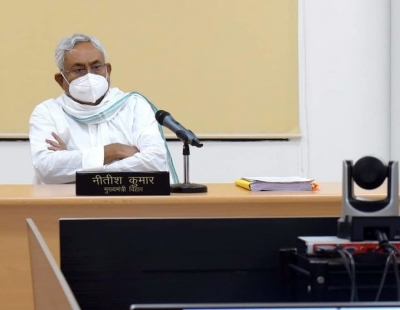Patna, Dec 26 (IANS) Bihar Chief Minister Nitish Kumar is currently holding the “Samaj Sudhar Abhiyan” (social reform campaign) across the state to regain his 2005 image of “Sushasan Babu” (good governance leader), badly hit by the crime spike, especially after 2020 Assembly election.
Nitish Kumar, who is ruling the state for last 16 years and is now in his fourth straight term as Chief Minister, is also seeking to undertake reforms in his party, the Janata Dal-United, after it came in third in the recent state Assembly elections.
Senior leaders of ruling JD-U believe that there is a challenge to rule the state, especially after it got much lesser seats than its ally BJP in 2020 Assembly polls.
Moreover, rising crime cases have hurt the image of Nitish Kumar, as the government’s focus on strict implementation of liquor ban, has led to policemen unable to deal with other crimes.
The Chief Minister has started the social reform campaign from Motihari town in east Champaran and alerted people about social evils such as consumption of liquor or involvement in crime. At the same time, he has directed administration and police to take stringent action against the accused.
The Additional Chief Secretary, Home, has directed police headquarters to prepare a list of wanted criminals, gangsters, bail jumpers, parole jumpers, carry out raids for their arrest and conduct speedy trial against them.
All District Magistrates have also been directed to recomend criminal cases for speedy trial as early as possible to ensure conviction of the accused.
Such a directive is visible on ground as Araria special court in Bihar has made a national record by pronouncing judgement of a POCSO case in a single day.
In the day-long trial on December 15, Justice Shashi Kant Rai, the POCSO Court Special Judge of Araria district, held the accused guilty and also sentenced them to life imprisonment.
In 2021, Bihar Police registered 2,29,915 cognisable crime cases till October 2021, including 2,378 murders, 8,707 kidnappings, 5,370 riots, 2,055 robberies, 1,274 rapes and 215 cases of dacoity in the state.
The cases of cognisable offences in corresponding period of 2020 were 2,14,968 which was lesser as compared to 2021.
When Nitish Kumar took over as Chief Minister from Rabri Devi in 2005, the law and order situation was worse. Kidnappings was part of organised crimes and gangsters were ruling the state in parallel Murders, rape, land grabbing and politicisation of criminals were the biggest challenges faced by Nitish Kumar then.
He had started the campaign against criminals in the first and second term of his government to change the image of Bihar. He had taken several initiatives, including speedy trials to crack down on notorious criminals, while gangsters-turned-politicians like Mohammad Shahabuddin, Anant Singh, Suraj Bhan Singh etc were put behind bars.
His government had recommended central agencies initiate investigations against them as well. However, some of the recommendations against specific individuals were seen as politically motivated as they are part of the opposition.
“Nitish Kumar wants to achieve the same image which he had achieved during first and second term of his government. He has smartly chosen to go on social reforms campaign in the state and at the same time also directed law enforcement agencies to take action against criminals,” said a JD-U leader.
JD-U chief spokesperson Neeraj Kumar, meanwhile, said that Nitish Kumar is a silent worker, who always looks after social reforms, followed by empowering people in the society.
“He believes that once social reforms are achieved in a state like Bihar, other challenges like crime will automatically reduce,” he said.
“When Nitish Kumar took over as Chief Minister in 2005, there was complete anarchy in the state. Kidnappings were part of organised crime and massacres were taking place everywhere. Murder and loot were common affairs in the state. Nitish Kumar managed to wipe out organised crimes and massacres from the state and it was possible through social reforms and awareness in the society,” he added.
“He (Nitish Kumar) managed to connect with common man and make them understand about the consequences of social evils. At that time, anarchy, massacres, youths involved in criminal activities were the social evils. Now liquor consumption is the biggest social evil and people of state should understand about it.”
Interestingly, in 2004 the cases of cognisable crimes were 1,15,216 and 1,04,778 in 2005. When Nitish Kumar took over as Chief Minister in 2005, the cases of cognisable crimes in 2006 was 1,10,716 which was higher than 2005. The figure further rose to 1,18,176 in 2007.
Rashtriya Janata Dal spokesperson Mritunjay Tiwari said: “Nitish Kumar is in power for last 16 years. What was the need of ‘Samaj Sudhar’ (social reforms). The system has completely collapsed. There is complete anarchy in bureaucracy. Even ruling ally Hindustani Awam Morcha chief Jitan Ram Manjhi questioned the liquor ban. I firmly believe that system reforms are required more than social reforms in Bihar.”
HAM spokesperson Danish Rizwan said: “The events organised under the social reforms campaign is funded by state government. Hence, we believe that he should also include at least one representative of other NDA parties as well. Every party has good sway in its respective areas. For example, HAM has great sway among Dalit community. If he includes us, it will send a good message among all communities in the state.”
Under the social reforms campaign, Nitish Kumar will visit majority of the districts in the state and it will end on January 15 in Patna.
–IANS
ajk/khz/d


Comments are closed.